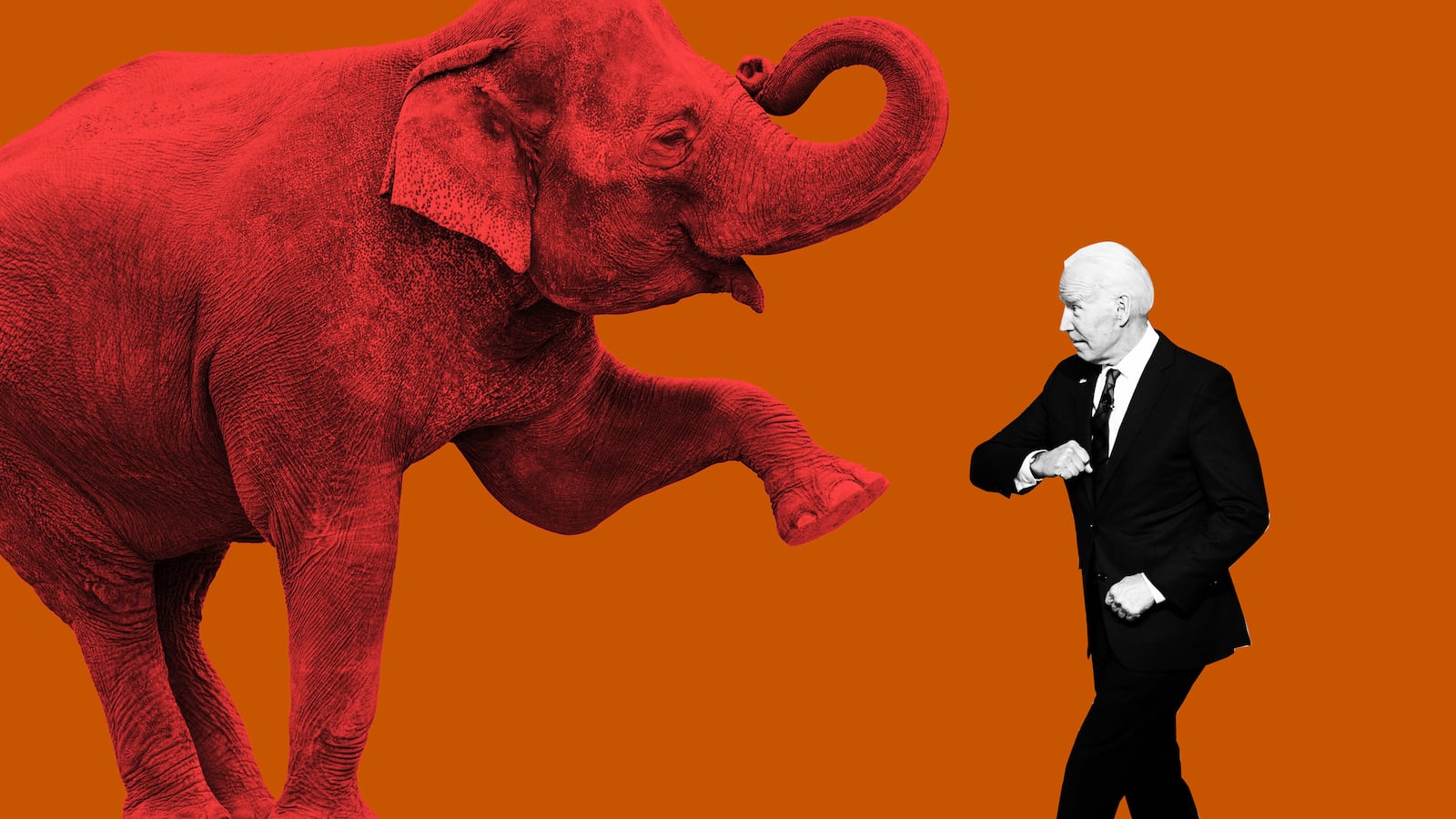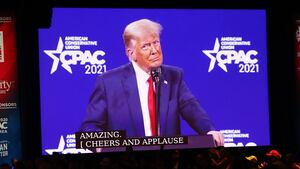The time to hesitate is through. With Donald Trump out of the White House, an argument is brewing on the Never Trump right over how to proceed. Should we push for a new center-right party, maintain our principled independence as intellectually honest opinion leaders above the fray? Or should we throw in with the Biden wing of the Democratic Party?
This is a big decision and, possibly, a crossroads. One prominent voice teasing the Biden option is Bill Kristol, editor-at-large of the Bulwark website. He recently floated a short but provocative trial balloon in his column at the Bulwark: “Mightn’t [anti-Trump conservatives] consider allying oneself with the Biden wing of the Democratic Party?”
In a follow-up piece that was published at the Bulwark on Monday, Kristol expounded on his suggestion, responded to some of the pushback his suggestion had elicited, and noted that he “wrote the piece to stimulate debate,” and was happy to have accomplished that goal.
Kristol is not without an argument. On the heels of Jan. 6, the Senate’s failure to convict Trump in the impeachment trial, and Trump’s CPAC speech, one could certainly argue that the GOP has become irredeemable and irretrievable. What is more, it is clear to most of us that the two-party binary paradigm is insurmountable.
And so, the logical solution to throw in with the Democrats—in an attempt to moderate what is, at least, America’s somewhat sane and rational party—is not absurd. Even I made an albeit short-term calculation along these lines when I voted for Joe Biden to defeat Bernie Sanders in the Democratic primary last year (this was only noteworthy because I’m a conservative who had previously never voted for a Democrat for president—even in the context of trying to elevate the most conservative alternative in a primary).
But can this work in the long-run? Kristol, whose father Irving was one of the liberals “mugged by reality” who joined the GOP, might be more optimistic than some of us are about the possibility of newcomers influencing the direction of a political party.
Personally, I think this thinking is quixotic. The Democratic Party controls the presidency and both houses of Congress. This was done with help from college-educated suburbanite Never Trumpers like Kristol, yes; however, it’s hard to imagine that Alexandria Ocasio-Cortez or even Kamala Harris would view an alliance with the likes of Kristol as an opportunity. They’d see his ilk joining their party as another insurrection. Not long ago, Kristol was viewed by a lot of Democrats as a neocon “warmonger” for his role in backing the Iraq war.
What is more, a quick glance at newsrooms and corporations makes the notion that an institution like the Democratic Party would be ripe for conservative infiltration, even on the margins, sound unlikely. As Michael Brenden Doherty writes at National Review, “Older, institutionally oriented liberals are simply incapable of resisting the demands or fending off the fatal attacks of younger left-wing staff. Why would the Democratic Party—almost alone—stand firm against the woke revolution that is roiling everything else?”
What is more, although he references the election of moderate Democrats in the 2018 midterms, they are hardly reflective of the zeitgeist. Thus, Kristol’s gambit is largely premised on Biden, who is 78 years old, remaining the central figure within the Democratic Party.
But let’s assume that it was possible for erstwhile conservatives to join the Democratic Party in sufficient ranks to have serious influence. Even if the influx of conservatives into the Democratic Party served this (in my opinion salutary) function, there would still be serious trade offs. You might try to change the party only to see the party change you. We have already seen how several prominent, erstwhile conservative writers have gradually transformed into liberals (if not progressives) after initially focusing their ire exclusively on Trump.
Functional political parties (including the Democratic Party) have a way of enforcing conformity—especially on issues deemed sacrosanct by the dominant members of their coalition. This was true decades ago when pro-life Democrats like Jesse Jackson and Ted Kennedy (and others, like Joe Biden and Al Gore, who voiced some reservations about abortion) were coerced into changing their views. And this coercion is more evident in today’s world because this is an era of nationalized politics with fully sorted parties.
Largely gone are the conservative Southern Democrats and the liberal Northern Republicans. When push comes to shove and the central debate involves teachers unions not wanting to do their jobs, trans-female athletes competing against biological girls in sports, or even something as banal as banning fracking on federal lands, would conservatives for Biden stand athwart popular opinion or change the subject back to Trump’s admittedly horrific presidency?
So far, the most prominent voice raising these questions has been Jonah Goldberg of the Dispatch, whose podcast named “The Remnant” betrays his stance on throwing in with any tribe. In a recent edition of his email newsletter, The G-File, Goldberg suggests that Kristol, whom he considers a friend, has already sublimated some of his conservative views as he prioritized defeating Trump. “[I]t’s been very hard to find examples of him publicly fighting for conservative principles these last few years if doing so could be construed as providing cover for Trump’s GOP,” Goldberg writes.
It is noteworthy that this (so far mostly friendly) debate over the direction of Never Trump is playing out between the Bulwark and the Dispatch: the two most prominent Never Trump outlets to emerge in the wake of Trump’s election. The former emerged after the Weekly Standard, co-founded by Bill Kristol, was “murdered” by its owner. Around the same time, the Standard’s Editor in Chief Steve Hayes c0-founded the Dispatch with Goldberg, who was increasingly out of step during the Trump era at his perch at National Review.
The Kristol vs. Goldberg disagreement is a microcosm of a slightly larger split. On the spectrum of Never Trump conservatism, the Bulwark leans more toward the resistance; some of this can be explained by virtue of how the key players viewed their function within the conservative movement and the GOP. Throughout his career, Kristol has long worn multiple hats, oscillating almost seamlessly between the worlds of journalism, activism, and partisan politics.
Likewise, the Bulwark’s Tim Miller, who is quoted in Kristol’s piece for coining the term “Red Dog Democrats,” was formerly a communications operative for the RNC, Jeb Bush, and other Republican-adjacent outfits. Conversely, Goldberg and Hayes identify more as center-right opinion journalists, independent analysts, and writers—not as players in the political process. It’s not surprising that they would come down on different sides of this issue. (I should note that I am on the record as being a fan of both the Bulwark and the Dispatch.)
Aside from our small numbers (a prohibitive problem, to be sure), the other problem with marshalling Never Trump forces for long-term political purposes is that our alliance is based on a negative: not liking Donald Trump. Aside from that admittedly important area of agreement, there are too many flavors of anti-Trump conservative. What is more, by definition, anyone who is willing to abandon his “team” is not likely to fall in line with a new leader, whether that new leader is Kristol, Goldberg, or… Biden.
I’m in the Goldberg camp, as evidenced by my refusal to vote for Trump or Biden last November. When I do vote, I feel like it is appropriate for me to disclose it (in the interest of transparency). But my primary function is not to elect or support politicians. My primary function is to be an intellectually honest writer with an admittedly conservative worldview.
Let’s just say that I won’t be signing up for the Democratic Party any time soon. At the same time, I hope I’m wrong about the naivete of others pursuing this plan. It seems like a fool’s errand to me, yes, but this is one of those times when I wouldn’t mind being proven wrong.





